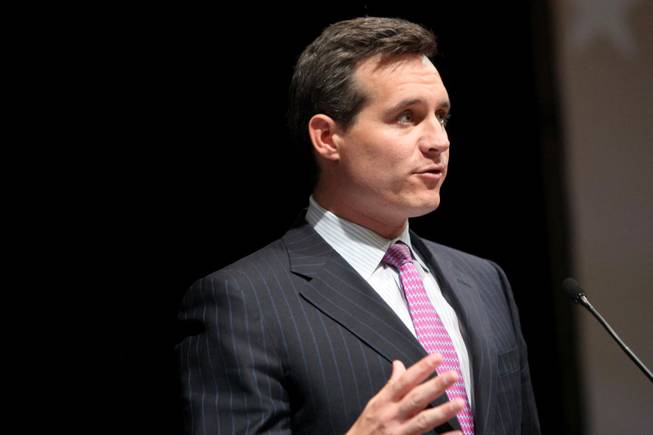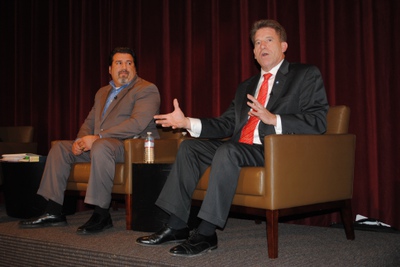
Secretary of State Ross Miller addresses the Nevada State Democratic Party Convention on June 26, 2010, at the Flamingo.
Friday, Jan. 11, 2013 | 4:47 p.m.

Panelists Andres Ramirez, left, president of the political consulting firm The Ramirez Group, and Minnesota Secretary of State Mark Ritchie discuss a voter ID proposal from Nevada Secretary of State Ross Miller. A panel at UNLV on Friday discussed Miller's proposed plan, a new voting system would link with Department of Motorized Vehicle’s license database, allowing poll workers to visually verify the identity of the person attempting to vote in Nevada.
Nevada Secretary of State Ross Miller drew a mix of cheers and boos Friday at UNLV as he presented a proposal to implement photographic verification of voters at polling places.
Under Senate Bill 63, which Miller plans to submit during the Legislature’s upcoming session, the state would replace the paper-based rolls used by poll workers to check in voters on Election Day. In place of those rolls would be an electronic system similar to the one already used during early voting.
“The existing system is completely antiquated,” Miller said. "It needs to be updated."
The new voting system also would link with Department of Motorized Vehicle’s license database, allowing poll workers to visually verify the identity of the person attempting to vote.
Although laws requiring voters to show driver’s licenses or other identification at the polls before casting a ballot have drawn criticism and lawsuits in other states, Ross and other members of a panel at a symposium Friday at UNLV’s Greenspun Hall said the Nevada bill would avoid many of the issues that have prompted uproar elsewhere.
“I don’t view this as a voter ID bill. ... No voter whatsoever will be required to bring any additional proof or evidence of who they are beyond what they’re already currently required to provide,” said panel member Andres Ramirez, president of the political consulting firm The Ramirez Group.
Under Miller’s bill, voters who aren’t in the DMV database could choose to either have their picture taken at the polling site or sign an affidavit confirming their identity. Miller said the inclusion of these provisions ensures that no one would be disenfranchised under the new voting system.
The electronic voter roll could also make it easier to vote by enabling same-day registration or allowing people to vote outside of their precincts.
Miller said same-day registration wouldn't be included in the bill in the Legislature, but that he saw it as a logical next step.
“This is a more secure system. I don’t think there are any good arguments against putting Election Day registration in place if you have the technology to verify somebody’s identify and residency before they vote,” Miller said.
The contents of the bill drew a mixed reaction from the crowd of about 75, which included a faction of self-identified members of local Tea Party and Republican groups alongside students and activists from voter’s rights groups.
A spirited exchange between the crowd and the panel, which included Miller, Ramirez, Minnesota Secretary of State Mark Ritchie and Brennan Center for Justice counsel Lee Rowland, took place during the question-and-answer session, with some members of the audience challenging and even interrupting the panelists.
Many questions focused on whether the new system would cut down on voter fraud and how it would ensure only eligible voters cast ballots.
Rowland said the new electronic system would allow for increased security because it could be cross-referenced with other government databases like the National Change of Address registry, allowing any suspicious or questionable voter registrations or ballots to be flagged for inspection.
“A huge benefit of an electronic poll book system is that it dramatically increases your ability to find and eliminate duplicates out of the system,” Rowland said. “Because it is more able to compare similar names, the electronic system is able to find those records and flag them for election officials.”
Other questions focused on whether the new system would increase the wait in line at the polls -- it wouldn't, Miller said -- or how much the system would cost to implement. The costs are unclear, according to Miller.

Join the Discussion:
Check this out for a full explanation of our conversion to the LiveFyre commenting system and instructions on how to sign up for an account.
Full comments policy